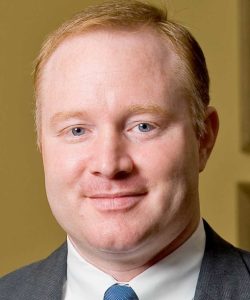The views expressed by contributors are their own and not the view of SuperTalk Mississippi Media
The definition of insanity is doing something over and over and expecting a different result. That is what is happening in today’s healthcare world, especially when it comes to prescription drugs. Mississippi pharmacists see this insanity every day when they are treating their patients in the communities across our state.
Pharmacy Benefit Managers (PBMs) claim to keep prescription drug costs down, but it is not in their financial interest to do that. PBMs, insurance companies, and managed care organizations have financial incentives to keep prescription drug prices high and then blame others for their tactics. Recently, the Mississippi Independent Pharmacies Association introduced legislation that would be the start of showing our state and its citizens much need transparency in the prescription drug world. This legislation would have made PBMs, insurance companies, and managed care organizations reimburse pharmacies with a new and totally transparent reimbursement methodology. This proposed reimbursement methodology is so transparent that the opposition called it a scheme and an egregious example of government overreach. I guess this is what happens when you propose a totally transparent reimbursement methodology, and you are upsetting the status quo for the entities that are forcing healthcare prices to increase year after year.
Our association and members understand the problems with prescription drug prices and coverage. The PBMs, insurance companies, and managed care organizations have been using an outdated method called Average Wholesale Price (AWP) that lacks credibility. The AWP methodology does not help the payors, pharmacies, and most importantly the patients. AWP has been open to several lawsuits in the past, and even one here in Mississippi that was settled by former Attorney General Jim Hood. These lawsuits found that AWP could be artificially inflated and manipulated thus causing overpayment for the payors and ultimately the patients. The Office of Inspector General found that the AWP-based reimbursement methodology was fundamentally flawed and caused Medicaid to pay too much for certain prescription drugs.

Due to the legal scrutiny the Centers of Medicare and Medicaid Services (CMS) created a working group to develop a more transparent benchmark for prescription drugs. After several years of study CMS developed a new prescription drug pricing benchmark call National Average Drug Acquisition Cost (NADAC) that would reflect the actual acquisition price of the prescription drug that are dispensed in pharmacies. NADAC is calculated from monthly surveys that are held with the help of retail pharmacies from across the United States. These surveys are calculated and updated weekly to reflect the truest acquisition cost that a retail pharmacy pays for prescription drugs, and the results are posted on the CMS website for total transparency. This new pricing benchmark is based on the actual cost of the prescription drug rather than the outdated AWP benchmark that is flawed and under scrutiny.
CMS required that all states Medicaid departments move to an actual acquisition cost reimbursement methodology in 2016. The Mississippi Division of Medicaid (DOM) has been using NADAC plus an $11.29 professional dispensing fee since April 2017. Some might ask how the DOM determined the $11.29 professional dispensing fee. DOM conducted a statewide survey to determine how much it cost a pharmacy to dispense a prescription. This was a very in-depth and well-thought-out survey, and the result was an average $11.29 cost for a Mississippi pharmacy to dispense a prescription. A pharmacies total reimbursement is made up of two parts, the cost of the prescription drug plus the professional dispensing fee. The sum of the two parts of the formula equals the total reimbursement to the pharmacy.
In commercial plans the outdated and flawed AWP is used with a much lower dispensing fee to reimburse pharmacies. What the new proposed NADAC plus $11.29 professional dispensing fee would do is create a fair and transparent reimbursement methodology that would save money for the payors and patients. NADAC lowers the cost of the drug compared to the AWP price and this cost savings more than offsets the increase in the dispensing fee.
The PBMs, insurance companies and manage care companies want everyone to believe that pharmacists are trying to line their pockets with money. That is not the truth. Pharmacy is one of the most trusted professions in our country, and pharmacists are a very important member of our country’s healthcare team.
Pharmacies are showing the world their acquisition cost for the prescription drug. When is the last time you went to the grocery store and the owner showed you the cost for the gallon of milk. Never! Pharmacies are prepared to show the world their cost and to show the world that they are not the problem with high prescription drug costs.
The business community did not take the time to study the benefits of using a NADAC reimbursement methodology. They have all been focused on the increase of the dispensing fee and not considering that NADAC helps lower the overall cost of the prescription drug spend. The business community have done themselves a great disservice and have been misled by the PBMs, insurance, companies, and managed care organizations. One must remember it is in the best interest of the PBMs, insurance companies, and manage care organizations to keep the status quo and not rock the boat. These corporate middlemen have created a business based on monopolistic tactics that only benefit themselves.
The Congressional Budget Office found that a plan like the plan our association has proposed would save taxpayers $1 billion in the Medicaid programs around our country.
The proposed legislation would not only fix the flawed and outdated AWP reimbursement methodology, but it would add extra benefit and savings for the payors and patients. Spread pricing is a tactic the PBMs, insurance companies, and managed care organizations use as a cash flow stream to raises the price of the prescription drug for the payors. Spread pricing occurs when these corporate middlemen reimburse the pharmacies a lower payment than they charge the payor, then pocket the difference.
Another cash stream for PBMs, insurance companies, and managed care organizations is the collecting of rebates from drug manufactures which are never passed on to the payors or patients. Our proposed legislation would require these corporate middlemen to disclose and pass on all drug manufacture rebates to the payors. Some payors claim they receive all the rebate money but how do they know. A man once said, trust but verify.
The Mississippi Legislature is very familiar with the practices of these corporate middlemen and have seen the unfair tactics that they hold over pharmacies, payors, and patients. Our legislation would add much needed transparency to the prescription drug world in Mississippi. The main argument from our opposition is that this legislation would raise costs. When the opposition is only focused on one aspect of the formula their numbers are wrong. If they would take the time to learn about the benefits of NADAC, they would realize the benefits of a NADAC reimbursement methodology like 43 states who have adopted this methodology in their Medicaid departments.
In closing, I would like to stress the fact that pharmacy is one of the most trusted professions in our country. Pharmacists are healthcare providers who want to help their patient’s well-being and health. When was the last time a PBM, insurance company, managed care organization, or any corporate middleman helped the patients of Mississippi? For someone to say pharmacists are creating a scheme to only help themselves is totally disingenuous and insulting to the pharmacists of our state.








